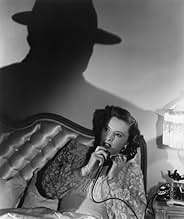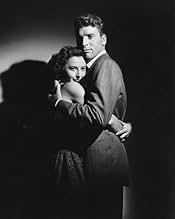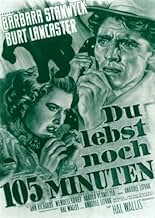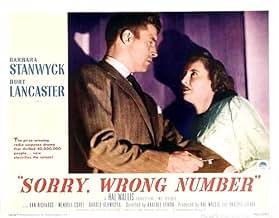IMDb-BEWERTUNG
7,3/10
13.537
IHRE BEWERTUNG
Eine kranke Frau belauscht am Telefon ein vermeintliches Mordkomplott und versucht, es zu verhindern.Eine kranke Frau belauscht am Telefon ein vermeintliches Mordkomplott und versucht, es zu verhindern.Eine kranke Frau belauscht am Telefon ein vermeintliches Mordkomplott und versucht, es zu verhindern.
- Für 1 Oscar nominiert
- 3 Gewinne & 3 Nominierungen insgesamt
Bill Cartledge
- Page Boy
- (Nicht genannt)
Cliff Clark
- Police Sergeant Duffy
- (Nicht genannt)
Joyce Compton
- Cotterell's Blonde Girlfriend
- (Nicht genannt)
Ashley Cowan
- Clam Digger
- (Nicht genannt)
Yola d'Avril
- French Maid
- (Nicht genannt)
Suzanne Dalbert
- Cigarette Girl
- (Nicht genannt)
Empfohlene Bewertungen
In New York, the spoiled Leona Stevenson (Barbara Stanswick) is the invalid wife of the VP of a pharmaceutical industry Henry J. Stevenson (Burt Lancaster)and becomes aware of a murder that would be committed late night of that day through a "cross-wire", when she overhears two men planning the murder.
Leona tries to find the right number to tell the police and she discovers that her former friend and ex-girlfriend of Henry, Sally Hunt Lord (Ann Richards), had lunch with him. She recalls the first encounter with her husband and parts of her life with him through flashbacks. Along the night, she learns dirty secrets about Henry and she finds that she might be the intended victim.
"Sorry, Wrong Number" is a great film-noir with a suspenseful story and top-notch performances. The screenplay and the direction are excellent and keep the attention of the viewer until the end of the last scene. This movie deserves to be watched more than once and is highly indicated for fans of film noir. My vote is nine.
Title (Brazil): "A Vida Por Um Fio - O Clássico" ("The Life for One Line - The Classic")
Note: On 29 September 2013, I saw this movie again.
Leona tries to find the right number to tell the police and she discovers that her former friend and ex-girlfriend of Henry, Sally Hunt Lord (Ann Richards), had lunch with him. She recalls the first encounter with her husband and parts of her life with him through flashbacks. Along the night, she learns dirty secrets about Henry and she finds that she might be the intended victim.
"Sorry, Wrong Number" is a great film-noir with a suspenseful story and top-notch performances. The screenplay and the direction are excellent and keep the attention of the viewer until the end of the last scene. This movie deserves to be watched more than once and is highly indicated for fans of film noir. My vote is nine.
Title (Brazil): "A Vida Por Um Fio - O Clássico" ("The Life for One Line - The Classic")
Note: On 29 September 2013, I saw this movie again.
Heck of a thriller, though the narrative is difficult to piece together at times. Stanwyck gets to run through a gamut of hysterical emotions as the intended victim. Her Leona is not particularly likable as the rich man's daughter who gets her way by bullying people around her. So there's some rough justice in her predicament—alone, disabled and dependent on the phone while a killer seemingly stalks her. Even the independent working-man, a studly Henry (Lancaster), is bullied into taking up with her. Of course, it doesn't hurt that she's got scads of money to assist her schemes. Incidentally, catch how Henry's several capitulations to others (Leona, Morano) are marked by allowing them to light his cigarette. Nice touch.
The idea of only gradually revealing why Leona is being set up for murder is a good one. It adds to the suspense—not just a 'when' but also a 'why'. The trouble is the disclosure is only revealed in pieces over the phone using flashbacks, and these are hard to piece together over a stretch of time. But enough comes through that we get the idea. There's some great noir photography from Sol Polito that really adds to the tense atmosphere. Anyhow, it's a great premise that also played well over the radio that I recall as a kid. It's also a subtle irony that one could end up being so alone in the middle of a great city. Poor Leona, maybe if she had been a little nicer and less bossy over the phone, she might have made the human connection she needed.
The idea of only gradually revealing why Leona is being set up for murder is a good one. It adds to the suspense—not just a 'when' but also a 'why'. The trouble is the disclosure is only revealed in pieces over the phone using flashbacks, and these are hard to piece together over a stretch of time. But enough comes through that we get the idea. There's some great noir photography from Sol Polito that really adds to the tense atmosphere. Anyhow, it's a great premise that also played well over the radio that I recall as a kid. It's also a subtle irony that one could end up being so alone in the middle of a great city. Poor Leona, maybe if she had been a little nicer and less bossy over the phone, she might have made the human connection she needed.
An expanded radio play and subsequent TV drama, this film builds terrific tension around a bedridden heiress and her telephone.
Sympathy builds for this unlikeable woman, Leona, played by Barbara Stanwyck. She is a spoiled heiress used to getting her own way, but as we come to see, very much created by her father (played by Ed Begley) who bows to all her wishes.
Her husband, Henry, played by Burt Lancaster, whom she chases and captures from her best friend, initially goes along with being an employee in her father's corporation but eventually starts chafing at the restraints imposed on him.
The movie just about plays in real time with the addition of many flashbacks, one of which secures the knowledge that there is nothing wrong with Leona, it is all psychosomatic based on her mother's fatal illness.
From the moment Leona accidentally overhears a plotted murder for later on that evening, the viewer is taken on a ride that builds suspense and tension to a terrifying conclusion and the movie's title.
Not to be missed. The cinematography is superb, a lot of play in light and shade. Barbara deserved an Oscar but lost. 8 out of 10.
Sympathy builds for this unlikeable woman, Leona, played by Barbara Stanwyck. She is a spoiled heiress used to getting her own way, but as we come to see, very much created by her father (played by Ed Begley) who bows to all her wishes.
Her husband, Henry, played by Burt Lancaster, whom she chases and captures from her best friend, initially goes along with being an employee in her father's corporation but eventually starts chafing at the restraints imposed on him.
The movie just about plays in real time with the addition of many flashbacks, one of which secures the knowledge that there is nothing wrong with Leona, it is all psychosomatic based on her mother's fatal illness.
From the moment Leona accidentally overhears a plotted murder for later on that evening, the viewer is taken on a ride that builds suspense and tension to a terrifying conclusion and the movie's title.
Not to be missed. The cinematography is superb, a lot of play in light and shade. Barbara deserved an Oscar but lost. 8 out of 10.
Sorry, Wrong Number (1948)
You can tell this thriller was once a radio play--it is mostly talk, and often over the telephone. But what drama can be built on a string of conversations around the office, in cars in the rain, out on a lonely beach on Staten Island, and on the telephone, often filled with mystery and doom.\
Not that it's not a visual movie, either. There is a big gloomy house, and lots of dark city streets. Shadows and moving camera and close-ups of faces and telephones, all keep you glued and increasingly worried. By the end, the really jarring, memorable end, you are ready for what you can never be ready for.
Beware, the plot is confusing. Even seeing it twice I had to pay attention to who was who, and what turn of events had just taken place. Part of the reason is there is a bewildering use of flashbacks, even flashbacks within flashbacks, told by all kinds of different characters. The plot is laid out methodically, but take notes as you go, or at least take note. The initial overheard phone call is key to it all, and it gets reinforced later somewhat, but pay heed there.
And the person on the phone? A sharp, bitter, convincing Barbara Stanwyck, who really knows how to be steely and vulnerable at the same time. Burt Lancaster is more solid and stolid, and maybe less persuasive overall, but he carries a more practical part of the story. It keeps coming back to Stanwyck in bed, and the telephone which is her contact with the facts, as they swirl and finally descend.
Director Anatole Litvak has some less known but thrilling dark dramas to look for, including Snake Pit. But this is his most sensational winner, partly for Stanwyck, and partly for the last five minutes, which is as good as drama gets.
You can tell this thriller was once a radio play--it is mostly talk, and often over the telephone. But what drama can be built on a string of conversations around the office, in cars in the rain, out on a lonely beach on Staten Island, and on the telephone, often filled with mystery and doom.\
Not that it's not a visual movie, either. There is a big gloomy house, and lots of dark city streets. Shadows and moving camera and close-ups of faces and telephones, all keep you glued and increasingly worried. By the end, the really jarring, memorable end, you are ready for what you can never be ready for.
Beware, the plot is confusing. Even seeing it twice I had to pay attention to who was who, and what turn of events had just taken place. Part of the reason is there is a bewildering use of flashbacks, even flashbacks within flashbacks, told by all kinds of different characters. The plot is laid out methodically, but take notes as you go, or at least take note. The initial overheard phone call is key to it all, and it gets reinforced later somewhat, but pay heed there.
And the person on the phone? A sharp, bitter, convincing Barbara Stanwyck, who really knows how to be steely and vulnerable at the same time. Burt Lancaster is more solid and stolid, and maybe less persuasive overall, but he carries a more practical part of the story. It keeps coming back to Stanwyck in bed, and the telephone which is her contact with the facts, as they swirl and finally descend.
Director Anatole Litvak has some less known but thrilling dark dramas to look for, including Snake Pit. But this is his most sensational winner, partly for Stanwyck, and partly for the last five minutes, which is as good as drama gets.
Barbara Stanwyck (as Leona Stevenson) is a neurotic woman, confined to her bed. She is married to the very attractive, and mysterious, young Burt Lancaster (as Henry Stevenson). Ms. Stanwyck relies on a state-of-the-art 1940s corded telephone to help communicate her needs. One evening, she picks up her phone and overhears two men plotting a murder; eventually, the crime moves too close to Stanwyck for comfort
Stanwyck is excellent as the spoiled, arrogant, and wealthy, but, ultimately, helpless heroine of Lucille Fletcher's adapted radio play (the part was originated on radio by Agnes Moorehead). The story picks up some flaws in its extension into a feature film; it is most frustrating as (flashbacks) ((within flashbacks)) (((within flashbacks))) occur; and, the story becomes a little confusing. Still, Stanwyck's fine performance carries the film to an exciting, tense, conclusion.
******** Sorry, Wrong Number (9/1/48) Anatole Litvak ~ Barbara Stanwyck, Burt Lancaster, Wendell Corey
Stanwyck is excellent as the spoiled, arrogant, and wealthy, but, ultimately, helpless heroine of Lucille Fletcher's adapted radio play (the part was originated on radio by Agnes Moorehead). The story picks up some flaws in its extension into a feature film; it is most frustrating as (flashbacks) ((within flashbacks)) (((within flashbacks))) occur; and, the story becomes a little confusing. Still, Stanwyck's fine performance carries the film to an exciting, tense, conclusion.
******** Sorry, Wrong Number (9/1/48) Anatole Litvak ~ Barbara Stanwyck, Burt Lancaster, Wendell Corey
Wusstest du schon
- WissenswertesAnatole Litvak: When Henry is having lunch with Sally, he asks the waiter if he knows who the gentleman is in the dark glasses at the table behind him. It's the director of the film.
- PatzerTwice, Leona turns on a radio, and music begins instantly and strongly. Radios of the film's era contained vacuum tubes that needed some time to warm up.
However, this would be filmmaker's prerogative, not wanting to slow the pace of the film with extended silence.
- Zitate
Henry Stevenson: [to Leona] I want you to do something. I want you to get yourself out of the bed, and get over to the window and scream as loud as you can. Otherwise you only have another three minutes to live.
- Crazy CreditsPROLOGUE: "In the tangled networks of a great city, the telephone is the unseen link between a million lives...It is the servant of our common needs-the confidante of our inmost secrets...life and happiness wait upon its ring...and horror...and loneliness...and...death!!!"
- VerbindungenEdited into Tote tragen keine Karos (1982)
Top-Auswahl
Melde dich zum Bewerten an und greife auf die Watchlist für personalisierte Empfehlungen zu.
- How long is Sorry, Wrong Number?Powered by Alexa
Details
- Erscheinungsdatum
- Herkunftsland
- Sprache
- Auch bekannt als
- Al filo de la noche
- Drehorte
- Hollywood, Kalifornien, USA(telephone switchboard at a telephone company office on Gower St.)
- Produktionsfirma
- Weitere beteiligte Unternehmen bei IMDbPro anzeigen
Box Office
- Weltweiter Bruttoertrag
- 1.974 $
- Laufzeit
- 1 Std. 29 Min.(89 min)
- Farbe
- Seitenverhältnis
- 1.37 : 1
Zu dieser Seite beitragen
Bearbeitung vorschlagen oder fehlenden Inhalt hinzufügen




































